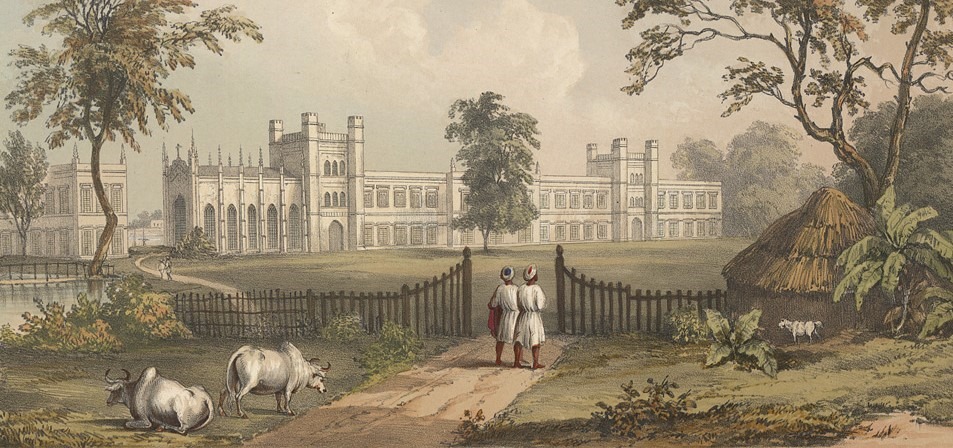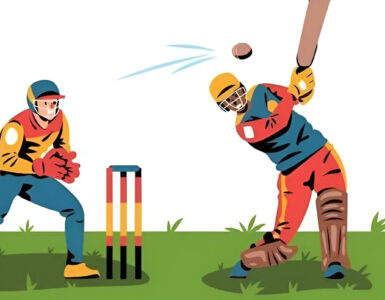Know How To Get Old?
Ashish Basu, 1983 Civil Engineering
“Don’t show off Anna, remember how old you are.” Thambi spoke as Ari increased his pace. Ari did remember but he responded as he always did, “You will remind me, even if I forget, right?”
This was their standard joke whenever they were on a long hike, particularly when Ari outpaced ‘Thambi’ (or younger brother in Tamil). They were on a steep climb to reach the point where their team of volunteers would do its day’s work to repair a popular trail. After they finished their volunteering work Ari and Thambi stopped over at Frau Schiller’s place for schnitzel dinner. This was Ari’s routine whenever he visited Thambi in Wiesbaden.
Their argument had not stopped, Thambi, also known as Trichur Ajayan Iyengar, continued,
“I was telling you Anna (or older brother in Tamil), ‘old’ has less to do with our biological age and more to with attitude. I am convinced, we should consider some fundamental changes.”
“What did you mean?” Ari or Arijit Sen asked. He did not quite understand Thambi’s logic.
Thambi and Ari were classmates in college in South India. As soon Ari had discovered that Ajay was one year younger, he had decided to call him ‘Thambi’ because that was one of the four Tamil words he knew then. As a payback Ajay immediately switched to ‘Anna’. They continued that habit for four decades even after their graduation, even when both were nearing retirement and had their grown children. Their classmates laughed at them then, many still did. Now, even in their sixties, their Thambi-Anna Tiki-taka continued. Thambi and Ari met whenever Ari’s work brought him to Europe. Frankfurt being a hub, airline logistics was relatively easy and Thambi always made himself available for Ari.
Thambi drizzled more lemon juice on his schnitzel and responded, “Anna, don’t start saying that I’ve forgotten my high school science. I understand that when our body and its principal organs get old, they function differently; they slow down; some could even malfunction causing major health issues. But my point is, we shouldn’t view this issue only through the lens of physiology. Perhaps we should consider a different approach, we should be thankful for what we have and make the most of it while we still can. There are a lot of uncertainties in life, as we grow old, we get more exposure to life’s tribulations. We must train ourselves to accept those and still enjoy the ride. Time flows in only one direction, Anna.”
“How so? On one hand, you were accepting that age matters; on the other hand, you seem to be disputing it. I don’t know if I know what you are talking about.” Ari stated with some trepidation and looked up from his plate. He had finished his generous portion of schnitzel.
Thambi forked some food in his mouth and said, “The point is, how you think about it, Anna. Yes, the body slows down with age. Yes, you couldn’t play soccer like you did for hours, anymore. But nothing stops you from watching soccer for hours or coaching soccer! You could attain similar enjoyment out of different set of activities that your body can cope with. Don’t fight with the body, listen to it, and adjust your enjoyment to its new, albeit slower, pace. An American tennis star recently called her retirement ‘evolving away’ from tennis. That’s the spirit, Anna, she had it all figured out.
“Our priorities, needs, desires, pleasures, enjoyment, all could evolve over time. Collectively and individually, we must be prepared for that evolution. Playing soccer in your teens could come close to watching soccer in your sixties in terms of enjoyment. Evolution, by definition, is not static. If you have that attitude, then getting old has less to do with age and more to do with how you pick the right set of interests; enjoy life and be thankful. At an individual level, we must plan for our own finances, healthcare etc. – those are the basics. But that is not all, staying engaged with the society productively is as important. Our communities, and local governments should have plans to complement those efforts by individuals. This shared responsibility should be accorded the highest priority. Think of life like a continuum Anna, there is no need to associate ‘age’ with that process. If the arbitration is only by age, then we would knowingly accept a downward spiral. Do you see where I am coming from, Anna?” Thambi paused and looked up at Ari, expecting him to be totally on board.
Ari was not on board yet, but he realized that Thambi was onto something. Clearly, he had thought about it at length. Ari called Frau Schiller and ordered two double Espressos and nodded for Thambi to continue. Thambi was building up a compelling argument and Ari was enjoying it. Ari himself was struggling lately with some aspects of the idea of ‘getting old’.
Thambi continued, “Anna, my German boss here in Wiesbaden used to say that a person in ‘Old Age’ should be seen as someone who was our Organizer, Leader, and Doer (OLD) until recently, many do not realize it, but those folks are usually very Articulate, Generous and Experienced (AGE) as well. The more I think about it, I think Herr Heinz captured the spirit of ‘OLD AGE’ in those words. Herr Heinz used to lament that the world did not see it that way though, the world’s view of the old is more like Opinionated, Loud, Dudes or Dames (OLD). His concern was valid, there was a disconnect. I had asked Herr Heinz to define old age. He said it starts somewhere after mid sixties when people start experiencing detachment – ‘By then your kids don’t need you; your responsibilities are all but done, and your spouse might be stuck with you. You are tolerated but not wanted,’ was the way he put it. After that I thought about it, much of it made sense regardless of where you live. As I reflected more, I felt the disconnect could be reduced if we prepared for it systematically.
“In OECD countries and most of the developing countries there are systems and processes in place for things like healthcare and finances for the old. But society’s participation stops there. Typically, society would not remain involved in the lives of old people beyond medical insurance and finances. But it should. OECD life expectancy is hovering around eighty years now, if you do the math, that’d mean fifteen or more years after retirement for many folks. Those years could be enjoyable or painful depending on how we did the preparation.
“Now neuroscience has established that our right and left brains are more balanced and work better with time. Why waste that talent away in the name of age. We have given too much importance to age; it has become an excuse and a very effective instrument for discrimination. We entered school based on age; we attained retirement based on age. When we retired, no one asked if we could still do the job or if we still wanted to do the job. We were just told to walk out when we attained a certain age limit. Some folks argued that such systems were necessary for the youth to backfill those jobs. We didn’t have to fire the old to hire the youth, but if we chose to fire the old, we should give them the tools to navigate.
“All those age-based societal markers were based on assumptions. We never challenged those assumptions. If we did, mandatory retirement age would have gone up in most countries with the increase in life expectancy. Because of the advances in medical science what was considered ‘old’ in your father’s generation is ‘middle age’ now. The other day I read an article by your favorite diplomat Dr. Tharoor; he wrote that he has published more books and delivered more lectures in his sixties. In his article Dr. Tharoor passionately argued about a need for attitudinal change. Last week your favorite actor Mr. Pitt joined the fray in an interview with the Vogue magazine. Both implied that the old should take care of themselves. Life expectancy has gone up in most parts of the world, those Opinionated, Loud, Dudes or Dames could be productive members of society in their mid-seventies now.”
Thambi paused after his long monologue, he knew he had Ari’s full attention. When Thambi started sipping his Espresso, Ari said, “Thambi, there is a personal angle to this as well. As people get old, they change. Along with their bodies their minds go through a change too. Many feel insecure about what they wanted to do in life and what they managed to accomplish. There could be pressures exerted by families, kids, communities, even countries. As people go past their sixties, they lose interest in many otherwise fascinating things like watching a beautiful sunset on the beach; they tend to withdraw in a shell. The world around, its voices, sights, sounds, smell might not interest them as much, anymore.
“Or they look at things differently as they get old. Let me share a recent personal anecdote.
“Last week, it was almost midnight when I came out of Atlanta’s Hartsfield Airport. As I bought a ticket and approached the Metro station at the Airport, I realized that I needed to check which train will stop at my station. A lone man stood in the platform; he was probably getting home after work. I was tired after a six-hour flight; I wanted to avoid making a mistake and get delayed. So, I approached him and asked if that train would stop at Peachtree station. The older African American man looked up through his thick glasses and responded it would. He said that was his destination too. That was when I noticed that he was reading an English Version of The Holy Koran. Just like me, maybe he was struggling with the idea of getting old, I reckoned. My respect for the man went up several notches. For a few minutes I thought to myself, if one had strong faith getting old could be easier. Most faiths talk about impermanence, so old age and leaving the planet could be more palatable. Reading The Koran at that hour of the night, all alone, had to be very meaningful to him.
“Anyway, our train arrived in due course. The man and I boarded the same compartment, we sat next to each other. On the way to Peachtree a few passengers boarded and alighted from the train, most sat away from us. There was that tall and confident looking young man, who wore a Georgia Tech sweatshirt. There was a lady in hijab, a man in ill-fitting Adidas track suit, and yet another lady in a saree. Then there was a very sophisticated looking lady who came in with a small roller backpack which had the logo of Atlanta’s Emory University.
To my surprise, I did not notice how they looked other than their clothes or how they conducted themselves, or their skin color. For the first time, I only registered their ages. All the passengers in the entire train-car were younger than the two of us. The two old Dudes!
With my extensive global travel, I am sure that type of an experience could have happened to me before, but I hadn’t noticed it because I was in a different frame of mind! My mindset about my own time on this planet had undergone a transformation. In the past, I was not conscious of it, it hit me hard that night. A voice in my head said, I was different. I was old.
“I realized that we were sitting with other humans, sharing the same space; breathing the same air in a train car, but the other humans would be on this planet after the two of us. Our time here would be up much before theirs. I was not necessarily sad about that thought, but it was a new realization. It felt different. I was not used to that idea of going away before the others around me. For the first time I understood that I had to learn to accept that idea for it was inevitable. I had to learn what getting old really meant, for myself!
“But did inevitable necessarily mean lack of choice? I knew eventually my body would signal slowing down, but could I not respond to those signals as I chose? I thought I could. Since my father’s passing, I had been thinking about old age a lot. Initially, I was depressed about the idea because I remembered how my father had suffered. My own conflicts were not about the onset of arthritis in my left hand or my knee pain or the fact that I could no longer do many things that I considered routine earlier. My conflicts were about how to go about living my life with those tell-tale signs of old age. It seems to me, you were also thinking about this topic, the societal aspects you raised resonated with my recent experience.”
Thambi had another leisurely sip of his Espresso and nodded.
Frau Schiller came by and asked if she could bring them a bottle of recently corked Riesling, or they would like the check. Ari looked at Thambi and he indicated they should pay and leave but Thambi displayed no visible sign of getting up. Ari knew that Frau Schiller, a good friend of Thambi’s, is not going to ask them to leave until they chose to, so he settled down.
After a long pause Thambi started again, “Anna, we must understand ‘getting old’ like any other evolutionary process. When the homo sapiens opted for farming instead of hunting, they acquired a set of new skills, tools, and techniques. Getting old is a learnable skill like that, the Opinionated, Lazy, Dudes or Dames would need many new skills. The goal should be to acquire those skills quickly so that their generosity and experience can help the society. Your experience in the Atlanta Metro was poignant, Anna. All of us, would have to go through such experiences. Those are legitimate because those represent the truth about life. We, the old, should know that our best years are behind us. But we should not allow those low moments to define our remaining time on this planet. As we go through this evolution, we should also be thankful. We must learn to live as if today is our last day on Earth. As one great seer said, ‘be mindful of your own existence on Earth and make it count’.
“In the previous phase of their evolution, our Opinionated, Loud, Dames might have been used to high heels; Dudes could have used studded soccer cleats or cowboy boots, now shoes with memory foam and slip resistant rubber would have to do. Keyboards would have to make room for voice activated input devices. Two-wheel bikes might have to make room for three wheeled vehicles. The built space for work and play could be custom made for the Opinionated, Loud, Dudes or Dames and so on. That is what it takes, Anna. Attitude is everything, you could see a dollar spent as an ‘expense’ or an ‘investment’; if you see it as an ‘expense’ you would try to minimize it, but if you train yourself to see it as an ‘investment’ you would try to maximize it. At that point you would want to focus on the highest return. I would like to encourage every community to look at their Opinionated, Loud, Dudes or Dames as ‘investments’. These investments would yield high returns. The Opinionated, Loud, Dudes or Dames themselves should see this as an investment as well. I must tell you, Anna, recently, I did a course on ‘the science behind happiness’ from the University.
“In that course we learned that happiness is a ‘learnable skill’, just like ‘getting old’ is. Anyone could learn those skills with some effort. Before that course, I used to think happiness is a spontaneous, amorphous, extra-terrestrial thing that just happens to some individuals. Some people are endowed with it, and some aren’t. No one had any control over it. Research showed that was not the case, the individual always had a major role. In that course we learned that there are skills, practices, and habits people can cultivate that could make them much happier. Meditation, mindfulness, and relationships are the new currencies of happiness. Getting old is a lot like that, the skills for attaining happiness and skills for getting old gracefully are similar. One instructor in our course was a Monk, he advised us to dump our egos as we aged, he emphasized the need for practicing detachment consciously. He would say, ‘Stop thinking that the world will come to an end without you, learn to live for YOU and let others be. You may not realize it, but that is the best way to help others.’ I asked that instructor why detachment was hard, he said ‘We have traveled far from the natural world that created us. You’d realize how far you’ve traveled only when you try to detach from your world of screens and things.’ Stunning insight, Anna.
“Imagine if a company assembled its Opinionated, Loud, Dudes or Dames a year before their retirement and took them through a mandatory training. Imagine if that training focused on teaching the right skills and adjustments. I could tell you Anna; the outcome would be amazing! Just like we could learn to be happy, we should all commit to learn ‘how to get old’. If we think of it as a skill, we could practice and get better at it. Today, we simply kick our Opinionated, Loud, Dudes or Dames out of the door with a ‘sink or swim’ attitude, it doesn’t work. I’d like to change that if I could. I would even devise a grading system that would predict which Opinionated, Loud, Dudes or Dames were likely to succeed, a simple ‘pass’ or ‘fail’ system. If someone failed, they would simply repeat the training. Right now, we are just ignoring the challenges and hoping we’d be fine. Hope is not a plan, Anna.
“We could use technologies like augmented reality in those training programs to give older folks an idea about what awaits them. Old age could be ‘life altering’, but it did not have to ‘life limiting’, Anna. Our current age denominated system is outdated. In that system after a certain age ‘you are a burden to society, you cannot do most things, you are tolerated but not wanted’. That view of the Opinionated, Loud Dudes or Dames is myopic, with that kind of thinking we’d all lose. I am proposing a new approach where societies actively encourage older folks to participate, we must learn to age gracefully. I am proposing a collective and individual ‘preparedness initiative’ for the old. This phase of our lives is too important and too long to ignore. Here is the irony, when we were young and sharp, we prepared for years for a four-year engineering course, but we’d do no preparation for a decade plus phase of our lives when we are no longer at our best! Logically, shouldn’t it be the other way round?
“We could create new programs to prepare folks from their late fifties. This must be a collective and individual effort; it is after all a shared responsibility. Focus ought to be on the quality of engagement. Countries like Japan already do a good job of this, good systems and processes exist in countries like Switzerland and Austria but those are exceptions. Believe it or not, this area needs more attention in OECD countries compared to India or China. In OECD countries nuclear families and insular cultures have decimated the extended family system. If you lived in Bengal, you’d get invitations for marriages or funerals from the second uncle of your fourth cousin every alternate week. If I lived in Trichur I would receive invitations for thread ceremonies and Kanakabhishekam every second week.
“By my daughter’s last estimate, we have some fourteen uncles and fifteen odd aunts in Trichur! In joint family-oriented cultures like those in India or China, uncles, aunts, and cousins emerge out of woodwork and engage the older folks. But even that wouldn’t last forever, it is changing already. Many of those practices would change in the future because of climate related challenges as well, some types of interactions are not going to be feasible at all. When societies have too many challenges, a few priorities could inevitably fall by the wayside. Engaging the old folks could be one of those ‘nice to have’ areas in the priority list. Those predictions bring about a new sense of urgency in what I had been saying, Anna. We must help ourselves to address this, it is a bad idea to expect the government or the society at large to address this for us. At its core, this is a large-scale skill building project. Emphasis should be on enhancing the participant’s ability not on the participant’s age.
Ari and Thambi had slowly walked out after paying as they continued talking. When they stepped out on the patio pergola before the parking lot, Ari stopped and looked at the starlit sky. After a minute or two Ari asked, “Thambi, have you tried out these ideas in real life or are these ideas living in your head rent-free? Your ideas are good, but implementation could be fraught with challenges. I’m not sure if the old would be even open to try out your ideas.”
As Ari continued stargazing, Thambi responded, “You are right to be skeptical, Anna. I have no illusions; this is not going to be easy. But we did try out a few ideas and some worked wonderfully. For example, Herr Heinz and I conducted multiple training sessions for retirees in our company. Using some funding from the state of Hesse, we taught them how to start small businesses; we showed them how to leverage online education on new topics; we also educated them on using social media for creating online communities and staying in touch like cohorts. All of the above are relatively easy to do in any country these days with a decent broadband connection. Out of the two-dozen people we mentored, we now have several small-scale entrepreneurs, online tutors, students even one budding politician in Bavaria. Herr Heinz was particularly proud of that one! Our participants did not think that they could embark on those fascinating journeys post retirement. Somebody had to show them the pathway, we played a small part. Now they feel more engaged and more energized and believe me they are wanted. We know ours was a small-scale effort, problems could crop up as soon as we try to scale it, but we think it was a good start, anyone can replicate our methods. We felt that was a better pathway than feeling depressed and unwanted.”
Ari finished his stargazing and said, “That is better than what I would have expected.”
Thambi nodded and continued, “That is what I had been doing, Anna! What would you say? Am I embarking on something unrealistic? I think we would see a good outcome.” Thambi concluded with a bow and waved his hand like Dumbledore did in Harry Potter movies before the grand feast started in the great hall at Hogwarts School of Witchcraft & Wizardry.
Watching Thambi’s antics, Ari laughed out so loud that Frau Schiller got startled at her cash counter. Ari controlled himself and managed to say, “Spoken like a truly Opinionated, Loud, Dude from Trichur, but that speech should have been delivered at the UN Headquarters!”
Thambi joined in the laughter as they walked towards Thambi’s Audi in the parking lot.
















খুব ভালো লেখা।